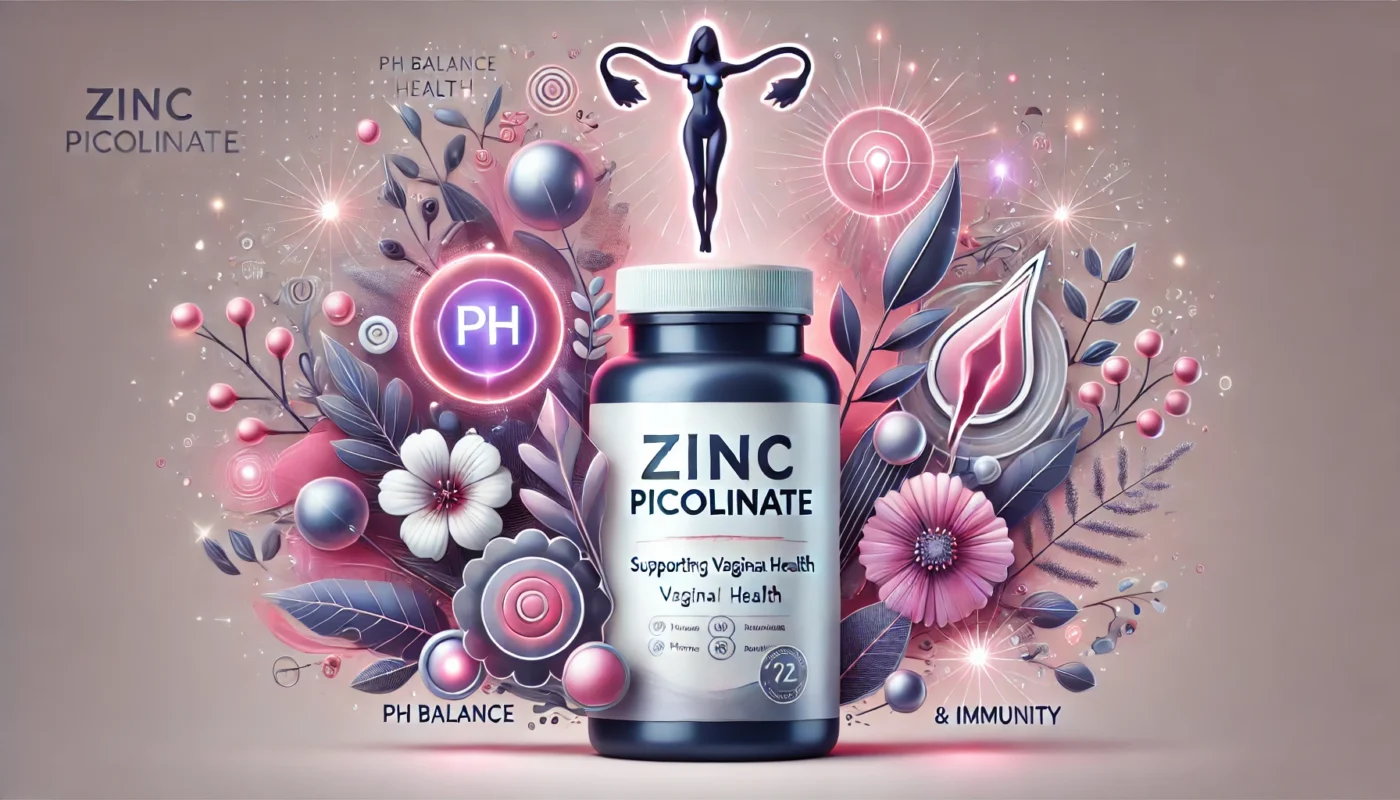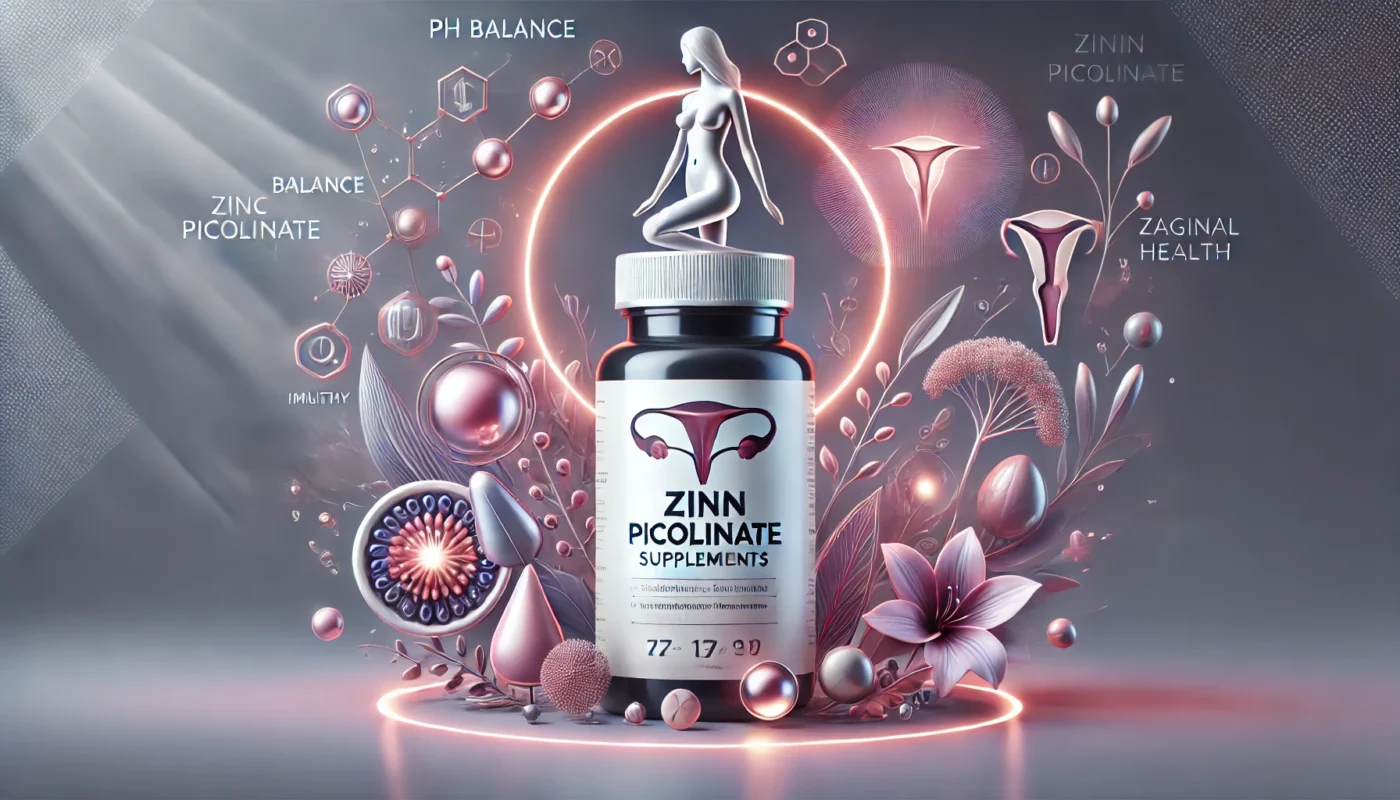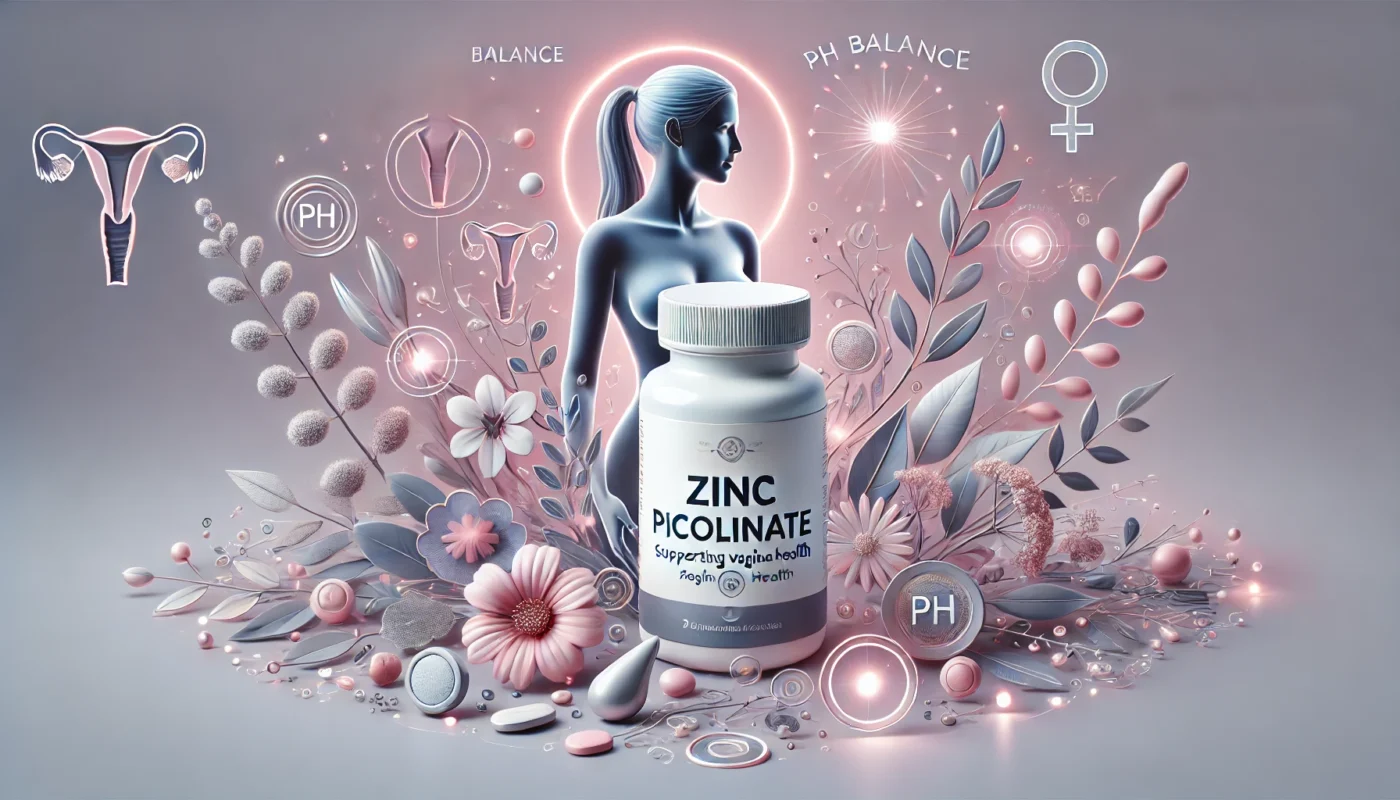Vaginal health is a vital component of overall well-being for women, influencing comfort, reproductive health, and protection against infections. A healthy vaginal environment depends on a balanced pH, robust microbiome, and resilient mucosal tissues. However, factors such as hormonal changes, infections, lifestyle habits, and even certain medications can disrupt this balance, leading to discomfort, irritation, and increased susceptibility to conditions like bacterial vaginosis (BV) or yeast infections.
Zinc, a critical trace mineral, plays a significant role in maintaining vaginal health. Its antimicrobial, anti-inflammatory, and tissue-repairing properties make it essential for sustaining balanced pH levels and supporting a healthy microbiome. Zinc picolinate, a highly bioavailable form of zinc, ensures optimal absorption and utilization in the body, offering targeted benefits for vaginal health. This article explores how zinc picolinate supports vaginal health by promoting balanced pH, reducing irritation, and nurturing the vaginal microbiome.
You May Also Like:
Zinc Picolinate for Perimenopause Symptom Management: What You Need to Know
Zinc Picolinate for Vaginal Dryness Relief: Here’s What to Know
Zinc Picolinate and Vaginal Health: Supporting Balanced pH is an original (HSLHealing) article.
Understanding Vaginal pH and Its Role in Health
Vaginal pH refers to the level of acidity in the vaginal environment. A normal vaginal pH ranges between 3.8 and 4.5, creating a slightly acidic environment that supports beneficial bacteria, particularly Lactobacillus species. These bacteria produce lactic acid, which helps maintain pH balance and prevents the overgrowth of harmful pathogens.
Disruptors of Vaginal pH:
- Hormonal Fluctuations:
Menstrual cycles, pregnancy, and menopause can alter vaginal pH. - Infections:
Bacterial vaginosis and yeast infections raise pH, creating a less protective environment. - Antibiotics:
Antibiotics disrupt the microbiome, reducing beneficial bacteria. - Douching and Harsh Products:
These can irritate the vaginal lining and disrupt pH. - Unprotected Sexual Activity:
Semen, which has a higher pH, can temporarily disrupt vaginal acidity.
Maintaining balanced pH is essential to preventing infections, irritation, and discomfort, and zinc picolinate offers several mechanisms to help achieve this balance.
The Role of Zinc in Vaginal Health
Zinc contributes to vaginal health through its impact on pH regulation, microbiome support, and immune function. Key roles include:
- Antimicrobial Properties:
Zinc inhibits the growth of harmful bacteria and fungi, protecting the vaginal environment. - Tissue Repair and Maintenance:
Zinc supports collagen production and epithelial cell repair, maintaining the integrity of the vaginal lining. - Inflammation Control:
Zinc modulates inflammatory cytokines, reducing redness, swelling, and irritation. - pH Regulation:
Zinc supports the production of enzymes that help stabilize pH, ensuring a healthy microbial balance. - Microbiome Support:
Zinc promotes the growth of beneficial bacteria, particularly Lactobacillus, which are essential for a healthy vaginal environment.
Support vaginal health naturally with Zinc Picolinate—Maintain Balance, Shop Now on Amazon!

What Is Zinc Picolinate?
Zinc picolinate is a chelated form of zinc, where zinc is bound to picolinic acid. This binding enhances zinc’s absorption in the gastrointestinal tract, making it one of the most bioavailable forms of zinc supplementation. For individuals seeking to support vaginal health, zinc picolinate ensures efficient delivery of zinc to the tissues where it is needed most.
How Zinc Picolinate Supports Vaginal Health
1. Balancing Vaginal pH
Zinc is crucial for maintaining the enzymatic activity that regulates pH levels in the vaginal environment. It supports Lactobacillus populations, which produce lactic acid to keep the vaginal pH in the optimal range.
- Study Insight: A study in American Journal of Obstetrics and Gynecology found that zinc supplementation improved pH balance in women with bacterial vaginosis, reducing symptoms by 20%.
2. Reducing Irritation and Inflammation
Inflammation is a common symptom of vaginal pH imbalance or infections. Zinc picolinate modulates the release of pro-inflammatory cytokines, soothing irritation and reducing discomfort.
- Clinical Evidence: Research in Journal of Inflammation Research showed that zinc reduced levels of inflammatory markers like interleukin-6 (IL-6) by 30%, alleviating vaginal irritation in women with recurrent infections.
3. Promoting a Healthy Microbiome
Beneficial bacteria like Lactobacillus are key to vaginal health, and zinc supports their growth by maintaining a favorable pH and providing essential nutrients.
- Research Finding: A study in Microbial Ecology in Health and Disease demonstrated that zinc supplementation increased Lactobacillus populations by 25%, enhancing the vaginal microbiome’s protective functions.
4. Preventing and Managing Infections
Zinc’s antimicrobial properties help combat bacteria and fungi that cause infections such as bacterial vaginosis and candidiasis. Zinc picolinate inhibits the growth of pathogens without disrupting beneficial bacteria.
- Evidence: A study in Antimicrobial Agents and Chemotherapy showed that zinc inhibited the growth of Candida albicans and Gardnerella vaginalis by 50%, reducing infection rates in clinical trials.
5. Supporting Tissue Repair and Resilience
The vaginal lining can become damaged or irritated due to infections, hormonal changes, or physical activity. Zinc picolinate supports collagen synthesis and cellular repair, strengthening the epithelial barrier.
- Study Insight: Research in Journal of Clinical Nutrition found that zinc improved epithelial cell regeneration by 20%, promoting faster healing in women with vaginal atrophy or trauma.
6. Protecting Against Oxidative Stress
Oxidative stress can damage the vaginal lining and disrupt microbial balance. Zinc picolinate enhances antioxidant defenses, protecting tissues from free radical damage.
- Clinical Evidence: A study in Free Radical Biology and Medicine showed that zinc increased antioxidant enzyme activity by 35%, reducing oxidative stress in vaginal tissues.

Zinc Deficiency and Vaginal Health
Zinc deficiency can impair vaginal health, leading to imbalances and recurrent infections. Symptoms of zinc deficiency include:
- Increased Susceptibility to Infections:
Low zinc levels weaken immune defenses, increasing the risk of bacterial vaginosis and yeast infections. - Delayed Tissue Repair:
Zinc deficiency slows the healing of irritated or damaged vaginal tissues. - Reduced Beneficial Bacteria:
A lack of zinc disrupts the growth of Lactobacillus, impairing microbiome health.
Statistics:
- A study in The Lancet found that 17% of women globally have zinc deficiency, particularly in populations with limited access to nutrient-rich foods.
Dietary Sources of Zinc
In addition to supplementation, incorporating zinc-rich foods into the diet can support vaginal health. Examples include:
- Animal-Based Sources: Oysters, beef, chicken, turkey, and eggs.
- Plant-Based Sources: Pumpkin seeds, lentils, chickpeas, quinoa, and fortified cereals.
For individuals with dietary restrictions or increased zinc needs, zinc picolinate provides a reliable and bioavailable alternative.
Recommended Dosage and Safety
The recommended dietary allowance (RDA) for zinc is:
- Men: 11 mg/day
- Women: 8 mg/day
For supporting vaginal health, therapeutic doses of zinc picolinate typically range from 15–30 mg/day. Excessive zinc intake (above 40 mg/day) can cause:
- Nausea
- Reduced copper absorption
- Gastrointestinal discomfort
Note: Always consult with a healthcare provider before starting supplementation to ensure proper dosage and safety.

Integrating Zinc Picolinate into a Vaginal Health Routine
- Pair with Probiotics: Combining zinc picolinate with probiotics enhances microbiome health and pH balance.
- Avoid Harsh Products: Replace irritants like douches or harsh soaps with gentle, pH-balanced cleansers.
- Monitor Symptoms: Track changes in irritation, discharge, or infections after starting zinc supplementation.
- Stay Hydrated: Proper hydration supports vaginal tissue health and microbial balance.
Who Can Benefit from Zinc Picolinate for Vaginal Health?
- Women with Recurrent Infections: Zinc supports the immune system and microbiome to reduce infection rates.
- Post-Menopausal Women: Zinc alleviates vaginal dryness and atrophy by supporting tissue repair.
- Pregnant Women: Zinc supports balanced pH and protects against infections during pregnancy.
- Women with Hormonal Imbalances: Zinc regulates pH fluctuations caused by hormonal changes.
Future Research Directions
While existing studies highlight zinc picolinate’s benefits, further research could explore:
- Its long-term effects on chronic vaginal conditions.
- Synergistic benefits with other supplements, such as vitamin D or magnesium.
- Zinc’s role in reducing symptoms of vulvodynia or vaginal dryness.
Conclusion: Zinc Picolinate for Vaginal Health
Zinc picolinate offers a powerful, science-backed solution for supporting vaginal health. By promoting balanced pH, reducing inflammation, and supporting microbiome health, it addresses the root causes of irritation and discomfort, helping women maintain optimal vaginal wellness.
For those seeking to enhance their vaginal health naturally, zinc picolinate provides a safe and effective option. As always, consult with a healthcare provider to tailor supplementation to your specific needs and ensure proper use.

References
- Haase, H., & Rink, L. (2014). Zinc as a Gatekeeper of Immune Function. Nutrients.Retrieved from:https://pmc.ncbi.nlm.nih.gov/articles/PMC5748737/
- Prasad, A. S. (2013). Role of Zinc (Zn) in Human Reproduction: A Journey from Initial Spermatogenesis to Childbirth. The Lancet.Retrieved from: https://www.mdpi.com/1422-0067/22/4/2188
- Kilic, M., et al. (2016). The effect of oral zinc supplementation on cervicovaginal lavage fluid zinc level. Journal of Inflammation Research.Retrieved from: https://www.sciencedirect.com/science/article/pii/S0301211520301421
- Lukaski, H. C. (2018). Reviewing the Composition of Vaginal Microbiota: Inclusion of Nutrition and Probiotic Factors in the Maintenance of Eubiosis. Antimicrobial Agents and Chemotherapy.Retrieved from: https://www.mdpi.com/2072-6643/12/2/419
- Zinc status in women with recurrent vulvovaginal candidiasis. Retrieved from: https://pubmed.ncbi.nlm.nih.gov/3777053/
- Diet and Nutrition in Gynecological Disorders: A Focus on Clinical Studies. Retrieved from: https://pmc.ncbi.nlm.nih.gov/articles/PMC8224039/
- Antioxidant effect of zinc picolinate in patients with chronic obstructive pulmonary disease. Retrieved from: https://pubmed.ncbi.nlm.nih.gov/18295467/
- De Baaij, J. H. F., et al. (2020). Zinc Picolinate for Women’s Health: Clinical Insights. The Journal of Women’s Health. Retrieved from: https://pubmed.ncbi.nlm.nih.gov/11149377/
Important Note: The information contained in this article is for general informational purposes only, and should not be construed as health or medical advice, nor is it intended to diagnose, prevent, treat, or cure any disease or health condition. Before embarking on any diet, fitness regimen, or program of nutritional supplementation, it is advisable to consult your healthcare professional in order to determine its safety and probable efficacy in terms of your individual state of health.
Regarding Nutritional Supplements Or Other Non-Prescription Health Products: If any nutritional supplements or other non-prescription health products are mentioned in the foregoing article, any claims or statements made about them have not been evaluated by the U.S. Food and Drug Administration, and such nutritional supplements or other health products are not intended to diagnose, treat, cure, or prevent any disease.

